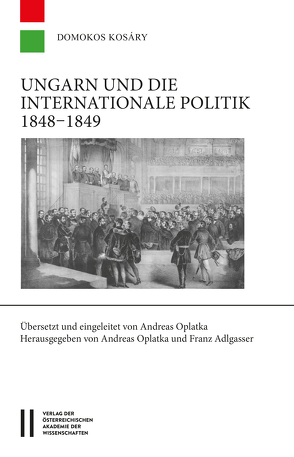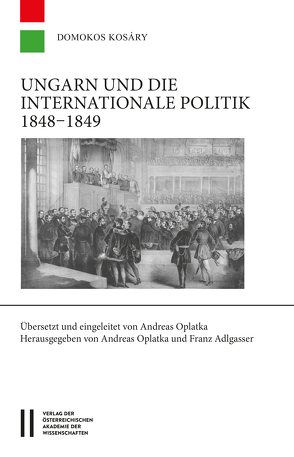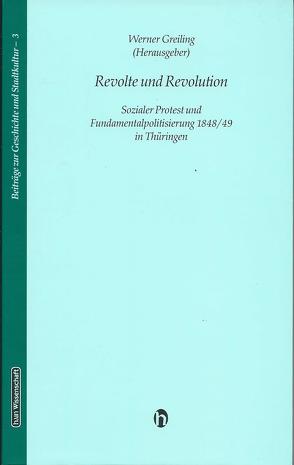Die Revolution von 1848/49 gehört zur politisch aktivsten Zeit von Marx und Engels. In Köln gaben sie von Juni 1848 bis Mai 1849 die Tageszeitung „Neue Rheinische Zeitung“ als „Organ der Demokratie“ heraus. Der Band zeigt ihr Wirken in der Revolution als radikale Politiker und als Herausgeber und Autoren der Zeitung. Sie treten zugleich als Leitartikelschreiber und Redakteure hervor, die tägliche Nachrichtenarbeit leisten. Der Band dokumentiert eine Vielzahl neu nachgewiesener Artikel, die erstmals in einer Marx-Engels-Edition erscheinen.
Aktualisiert: 2023-05-29
> findR *
Die Revolution von 1848/49 gehört zur politisch aktivsten Zeit von Marx und Engels. In Köln gaben sie von Juni 1848 bis Mai 1849 die Tageszeitung „Neue Rheinische Zeitung“ als „Organ der Demokratie“ heraus. Der Band zeigt ihr Wirken in der Revolution als radikale Politiker und als Herausgeber und Autoren der Zeitung. Sie treten zugleich als Leitartikelschreiber und Redakteure hervor, die tägliche Nachrichtenarbeit leisten. Der Band dokumentiert eine Vielzahl neu nachgewiesener Artikel, die erstmals in einer Marx-Engels-Edition erscheinen.
Aktualisiert: 2023-05-29
> findR *

The late work of the great Hungarian historian Domokos Kosáry, Ungarn und die internationale Politik 1848–1849 [Hungary and International Politics in 1848–1849], deals with a much written-about subject. Yet no other historian has ever presented it in the way Kosáry does. The conflict between Austria and Hungary, leading to a war in the early autumn of 1848, is described by Kosáry in a general survey of European opinions and interests of that time, as they existed in London and Paris, St. Petersburg and Istanbul, Turin, Belgrade and Bucharest. He also describes the activities of exiled Eastern-Central-European personalities in great detail, especially those undertaken by the Polish prince Czartoryski. As a result, he shows that England, the leading European power at that time, did indeed feel a certain sympathy with the Hungarian war of independence but British foreign policy, shaped by Palmerston, consistently and sharply opposed Hungary’s secession. In London’s view, a strong Austrian Empire in the middle of the continent remained a strict necessity due to its function as a counterweight to Russia. The Hungarian government, born in the revolution of 1848, had overestimated its international elbow room. In addition, it complicated Hungary’s situation by a long-lasting, firm policy against the autonomy-ambitions of national minorities. True, the possibilities for the Hungarians were greatly restricted as the Austrian side never showed any readiness to negotiate with “rebels”. Kosáry’s conclusion, with regard to the past as well as the present and addressing Hungary (and all small countries), reads as follows: since the early 16th century, autonomous policies in Europe have only worked within borders created by changes in the European system. Only within the respective margin can damage be minimised or advantages perceived.
Aktualisiert: 2023-05-12
> findR *

The late work of the great Hungarian historian Domokos Kosáry, Ungarn und die internationale Politik 1848–1849 [Hungary and International Politics in 1848–1849], deals with a much written-about subject. Yet no other historian has ever presented it in the way Kosáry does. The conflict between Austria and Hungary, leading to a war in the early autumn of 1848, is described by Kosáry in a general survey of European opinions and interests of that time, as they existed in London and Paris, St. Petersburg and Istanbul, Turin, Belgrade and Bucharest. He also describes the activities of exiled Eastern-Central-European personalities in great detail, especially those undertaken by the Polish prince Czartoryski. As a result, he shows that England, the leading European power at that time, did indeed feel a certain sympathy with the Hungarian war of independence but British foreign policy, shaped by Palmerston, consistently and sharply opposed Hungary’s secession. In London’s view, a strong Austrian Empire in the middle of the continent remained a strict necessity due to its function as a counterweight to Russia. The Hungarian government, born in the revolution of 1848, had overestimated its international elbow room. In addition, it complicated Hungary’s situation by a long-lasting, firm policy against the autonomy-ambitions of national minorities. True, the possibilities for the Hungarians were greatly restricted as the Austrian side never showed any readiness to negotiate with “rebels”. Kosáry’s conclusion, with regard to the past as well as the present and addressing Hungary (and all small countries), reads as follows: since the early 16th century, autonomous policies in Europe have only worked within borders created by changes in the European system. Only within the respective margin can damage be minimised or advantages perceived.
Aktualisiert: 2023-05-12
> findR *

The late work of the great Hungarian historian Domokos Kosáry, Ungarn und die internationale Politik 1848–1849 [Hungary and International Politics in 1848–1849], deals with a much written-about subject. Yet no other historian has ever presented it in the way Kosáry does. The conflict between Austria and Hungary, leading to a war in the early autumn of 1848, is described by Kosáry in a general survey of European opinions and interests of that time, as they existed in London and Paris, St. Petersburg and Istanbul, Turin, Belgrade and Bucharest. He also describes the activities of exiled Eastern-Central-European personalities in great detail, especially those undertaken by the Polish prince Czartoryski. As a result, he shows that England, the leading European power at that time, did indeed feel a certain sympathy with the Hungarian war of independence but British foreign policy, shaped by Palmerston, consistently and sharply opposed Hungary’s secession. In London’s view, a strong Austrian Empire in the middle of the continent remained a strict necessity due to its function as a counterweight to Russia. The Hungarian government, born in the revolution of 1848, had overestimated its international elbow room. In addition, it complicated Hungary’s situation by a long-lasting, firm policy against the autonomy-ambitions of national minorities. True, the possibilities for the Hungarians were greatly restricted as the Austrian side never showed any readiness to negotiate with “rebels”. Kosáry’s conclusion, with regard to the past as well as the present and addressing Hungary (and all small countries), reads as follows: since the early 16th century, autonomous policies in Europe have only worked within borders created by changes in the European system. Only within the respective margin can damage be minimised or advantages perceived.
Aktualisiert: 2023-02-23
> findR *
Die Revolution von 1848/49 gehört zur politisch aktivsten Zeit von Marx und Engels. In Köln gaben sie von Juni 1848 bis Mai 1849 die Tageszeitung „Neue Rheinische Zeitung“ als „Organ der Demokratie“ heraus. Der Band zeigt ihr Wirken in der Revolution als radikale Politiker und als Herausgeber und Autoren der Zeitung. Sie treten zugleich als Leitartikelschreiber und Redakteure hervor, die tägliche Nachrichtenarbeit leisten. Der Band dokumentiert eine Vielzahl neu nachgewiesener Artikel, die erstmals in einer Marx-Engels-Edition erscheinen.
Aktualisiert: 2023-03-30
> findR *

The late work of the great Hungarian historian Domokos Kosáry, Ungarn und die internationale Politik 1848–1849 [Hungary and International Politics in 1848–1849], deals with a much written-about subject. Yet no other historian has ever presented it in the way Kosáry does. The conflict between Austria and Hungary, leading to a war in the early autumn of 1848, is described by Kosáry in a general survey of European opinions and interests of that time, as they existed in London and Paris, St. Petersburg and Istanbul, Turin, Belgrade and Bucharest. He also describes the activities of exiled Eastern-Central-European personalities in great detail, especially those undertaken by the Polish prince Czartoryski. As a result, he shows that England, the leading European power at that time, did indeed feel a certain sympathy with the Hungarian war of independence but British foreign policy, shaped by Palmerston, consistently and sharply opposed Hungary’s secession. In London’s view, a strong Austrian Empire in the middle of the continent remained a strict necessity due to its function as a counterweight to Russia. The Hungarian government, born in the revolution of 1848, had overestimated its international elbow room. In addition, it complicated Hungary’s situation by a long-lasting, firm policy against the autonomy-ambitions of national minorities. True, the possibilities for the Hungarians were greatly restricted as the Austrian side never showed any readiness to negotiate with “rebels”. Kosáry’s conclusion, with regard to the past as well as the present and addressing Hungary (and all small countries), reads as follows: since the early 16th century, autonomous policies in Europe have only worked within borders created by changes in the European system. Only within the respective margin can damage be minimised or advantages perceived.
Aktualisiert: 2023-02-23
> findR *
Auf Druck Napoleons erklärte Kaiser Franz II. 1806 die reichsoberhauptliche Würde für erloschen. Den unter den Deutschen weitverbreiteten Wunsch nach dem neuerlichen Zusammenschluss in einem Reich erfüllte der Wiener Kongress 1814/1815 mit der Schaffung des lockeren Deutschen Bundes nur unzulänglich. Die von der Nationalversammlung in Frankfurt im Revolutionsjahr 1848/1849 erarbeitete Verfassung blieb unausgeführt, ebenso scheiterte der anschließende Versuch Preußens, einen Bundesstaat zu bilden. Erst 1867 gelang das wenigstens für Norddeutschland. 1871 wurde die volle deutsche Einheit erreicht. Dem schweren Weg vom alten zum neuen Reich ist die vorliegende Darstellung gewidmet. Es handelt sich nicht um eine deutsche Geschichte dieser mehr als sechs Jahrzehnte im umfassenden Sinn, sondern umd die Nachzeichnung einer sehr wichtigen Entwicklungslinie.
Aktualisiert: 2023-04-01
> findR *
Werner Greiling: Neustadt/Orla in der Revolution von 1848/49
Mike Stieber: Die demokratische Bewegung im reußischen Oberland 1848/49
Wibke von Häfen: "Auf nach Frankfurt!" Wahlrecht und Wahlen im Großherzogtum Sachsen-Weimar-Eisenach 1848
Hans-Werner Hahn: Die Revolution von 1848/49 in Thüringen und die Wurzeln unserer Demokratie
Aktualisiert: 2019-01-19
> findR *
Die Revolution von 1848/49 gehört zur politisch aktivsten Zeit von Marx und Engels. In Köln gaben sie von Juni 1848 bis Mai 1849 die Tageszeitung „Neue Rheinische Zeitung“ als „Organ der Demokratie“ heraus. Der Band zeigt ihr Wirken in der Revolution als radikale Politiker und als Herausgeber und Autoren der Zeitung. Sie treten zugleich als Leitartikelschreiber und Redakteure hervor, die tägliche Nachrichtenarbeit leisten. Der Band dokumentiert eine Vielzahl neu nachgewiesener Artikel, die erstmals in einer Marx-Engels-Edition erscheinen.
Aktualisiert: 2023-03-30
> findR *
Das Leben des Bürgerwehrgenerals Lorenz Cantador 1810-1883
Aktualisiert: 2022-02-15
> findR *
MEHR ANZEIGEN
Bücher zum Thema 1848-1849
Sie suchen ein Buch über 1848-1849? Bei Buch findr finden Sie eine große Auswahl Bücher zum
Thema 1848-1849. Entdecken Sie neue Bücher oder Klassiker für Sie selbst oder zum Verschenken. Buch findr
hat zahlreiche Bücher zum Thema 1848-1849 im Sortiment. Nehmen Sie sich Zeit zum Stöbern und finden Sie das
passende Buch für Ihr Lesevergnügen. Stöbern Sie durch unser Angebot und finden Sie aus unserer großen Auswahl das
Buch, das Ihnen zusagt. Bei Buch findr finden Sie Romane, Ratgeber, wissenschaftliche und populärwissenschaftliche
Bücher uvm. Bestellen Sie Ihr Buch zum Thema 1848-1849 einfach online und lassen Sie es sich bequem nach
Hause schicken. Wir wünschen Ihnen schöne und entspannte Lesemomente mit Ihrem Buch.
1848-1849 - Große Auswahl Bücher bei Buch findr
Bei uns finden Sie Bücher beliebter Autoren, Neuerscheinungen, Bestseller genauso wie alte Schätze. Bücher zum
Thema 1848-1849, die Ihre Fantasie anregen und Bücher, die Sie weiterbilden und Ihnen wissenschaftliche
Fakten vermitteln. Ganz nach Ihrem Geschmack ist das passende Buch für Sie dabei. Finden Sie eine große Auswahl
Bücher verschiedenster Genres, Verlage, Autoren bei Buchfindr:
Sie haben viele Möglichkeiten bei Buch findr die passenden Bücher für Ihr Lesevergnügen zu entdecken. Nutzen Sie
unsere Suchfunktionen, um zu stöbern und für Sie interessante Bücher in den unterschiedlichen Genres und Kategorien
zu finden. Unter 1848-1849 und weitere Themen und Kategorien finden Sie schnell und einfach eine Auflistung
thematisch passender Bücher. Probieren Sie es aus, legen Sie jetzt los! Ihrem Lesevergnügen steht nichts im Wege.
Nutzen Sie die Vorteile Ihre Bücher online zu kaufen und bekommen Sie die bestellten Bücher schnell und bequem
zugestellt. Nehmen Sie sich die Zeit, online die Bücher Ihrer Wahl anzulesen, Buchempfehlungen und Rezensionen zu
studieren, Informationen zu Autoren zu lesen. Viel Spaß beim Lesen wünscht Ihnen das Team von Buchfindr.










